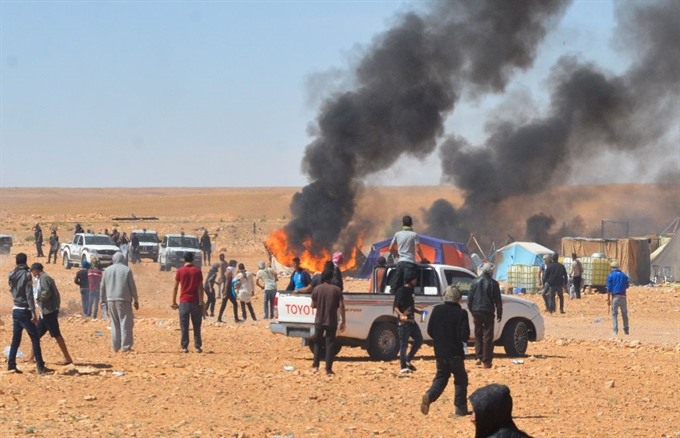 World
World

Tunisia declared a "war on corruption" on Wednesday after the arrest of three businessmen and a customs officer on suspicion of graft and financing protests in the North African country.
 |
| Smoke billows during clashes between Tunisian protesters and security forces outside the El Kamour oil and gas pumping station, in the southern state of Tataouine, on May 22, 2017. — AFP/VNA Photo |
TUNIS — Tunisia declared a "war on corruption" on Wednesday after the arrest of three businessmen and a customs officer on suspicion of graft and financing protests in the North African country.
Corruption was widespread under longtime president Zine El Abidine Ben Ali, who was ousted in a 2011 uprising, and has remained endemic since.
"In the war on corruption, there’s no choice. It’s either corruption or the state. Either corruption or Tunisia," said Prime Minister Youssef Chahed.
"I want to reassure all Tunisians that the government will see this war on corruption through to the end," he said in his first comments since the arrests started on Tuesday.
A senior official, on condition of anonymity, told AFP earlier that businessmen Chafik Jarraya, Yassine Chennoufi and Nejib Ben Ismail along with customs officer Ridha Ayari were arrested Tuesday "under the state of emergency" in force in Tunisia since November 2015.
"They are implicated in affairs of corruption and suspected of plotting against state security through incitement and alleged financing of the protest movements in Tataouine and other regions," he said.
The arrests come after a young man, Anouar Sakrafi, died of injuries suffered Monday when he was run over by a national guard vehicle during clashes with security forces in the southern desert region of Tataouine, the scene of long-running protests over joblessness.
Governor resigns
Security forces fired tear gas as protesters tried to storm the El Kamour oil and gas plant, radio reports said.
Dozens of people were hurt in the clashes, including about 20 security personnel. But the government said Sakrafi’s killing was accidental.
Protesters have been camped outside the El Kamour pumping plant for about a month, blocking trucks from entering, to demand a share of resources and employment in the sector.
Clashes also erupted between protesters and security forces on Monday in the city of Tataouine, where buildings showed evidence of having been set alight.
On Wednesday, Tataouine’s new governor, Mohamed Ali Barhoumi, resigned just weeks after being named to the position, saying in a post on Facebook that it was "for strictly personal reasons".
He was named governor in late April after two senior officials were dismissed following a visit by Chahed to the troubled region.
The premier was shouted down and forced to leave a heated town hall meeting.
Chahed has vowed to fight corruption since taking office last year, when the head of the national anti-graft body, Chawki Tabib, warned the problem had reached "epidemic" proportions.
The latest arrests come after Ben Ali’s nephew, Imed Trabelsi, apologised to the Tunisian people on national television last week for the rife corruption during his uncle’s regime.
’Smokescreen’
He recounted how he grew rich thanks to a well-oiled system involving the complicity of customs officers, high officials and ministers.
Tunisians on social media and in the press applauded Tuesday’s arrests, calling for the launch of an anti-graft probe such as Italy’s "Clean Hands" campaign in the 1990s.
But others said they hoped the arrests were not a "smokescreen" at a time when the authorities faced mounting social unrest.
Youssef Belgacem, from anti-corruption non-governmental organisation I-Watch, tentatively welcomed the "surprising" arrests.
"We hope it’s a serious first step in the war against corruption and the corrupt, and not an attempt to appease protests in Tataouine and elsewhere," he said.
"The list of corruption barons is still long."
Political activist Jaouhar Ben Mbarek wrote on Twitter: "If this is a real change of policy, then Chahed will find nothing but support from the Tunisian people."
Tunisia was ranked 75th out of more than 170 countries in the 2016 corruption perceptions index published by Transparency International. It had been 59th in 2010. — AFP




